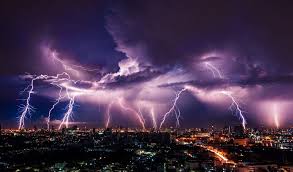Thankfully, direct lightning strikes aren’t common but protecting your business network this spring and summer means taking the steps necessary to prevent surges in wiring and damage that can occur. Unfortunately, you can’t unplug your gear and hide when the sky rumbles. Here are some tips to keep your business network functioning in all weather this spring and summer.
 When it comes to protecting your business network from lightning strikes caused by thunderstorms, it’s important to consider the value of your company’s equipment, data and the cost of outages to your business. If you don’t take the necessary precautions, you risk losing easily replaceable but expensive business network equipment. Your company could lose its accounting records or customer data. And your company might cease operations due to a broken broadband modem or server. But this doesn’t have to be you.
When it comes to protecting your business network from lightning strikes caused by thunderstorms, it’s important to consider the value of your company’s equipment, data and the cost of outages to your business. If you don’t take the necessary precautions, you risk losing easily replaceable but expensive business network equipment. Your company could lose its accounting records or customer data. And your company might cease operations due to a broken broadband modem or server. But this doesn’t have to be you.
If your business experiences a lightning strike, if you observe smoke or charring outlets and equipment, it’s important that you disconnect power immediately and ensure a fire hasn’t started. In a bad strike, surge protectors have little components that can absorb the surge. For businesses located in older buildings with generations of different wiring, hiring an electrician to evaluate grounding is well worth the time and money spent. Two-prong outlets don’t provide the benefits of electrical grounding and new outlets/wiring are worth the investment so your company’s computers and equipment are better protected. With better grounding in your building, lightning travels down the grounding wire rather than damaging your equipment. In some cases, businesses have wisely opted for installing a whole-house surge protector on their electrical panels. This is like putting every outlet on a high-end surge protector.
If installing a whole-house surge protector on the building’s electrical panels is prohibited, Uninterruptable Power Supplies (UPS) are the next best option. Uninterruptable Power Supplies power equipment through short power failures and in most cases also provide surge protection. Continuous power and surge protection are essential with today’s dependence on the Internet for phone and other communications. A UPS can range from $60-$150 depending on your business needs. One size doesn’t fit all and it’s better to err on the side of overdoing it when it comes to protecting your office computers and equipment from power surges.
Surge arrestors are a way to connect business phone lines to electrical ground. But if your company is a DSL user, be sure to test surge arrestors. Unfortunately, a cheap phone cord or surge arrestor can hurt DSL performance. For a few dollars, phone line surge protectors are well worth the quality they provide on each line. When well-grounded to electrical ground, phone line surge protectors divert the damaging energy from lightning strikes.
Any computer towers or tall metal structures should have a connection to ground. Grounding to both earth with a grounding rod and an electrical service ground is essential. If you don’t have both, your computers and any electronics become the bridge between the ground and a lightning strike and damage will ensue. While grounding towers can be expensive, it costs a lot less than your insurance deductible or the hassles associated with repairing damaged computers and electronics. For any cables on or outside your towers, be sure to shield them and have them grounded at the base.
One of the best ways to stop surges is to use fiber optics. Fiber optics uses glass, an electrical insulator. Long copper cables that connect buildings together work like antennas that pick up energy from lightning and cause damage. Because of copper data wiring, lighting that affects one building creates a difference in voltage between two buildings. This can cause damage to the copper data wiring. While outdoor fiber cable is inexpensive, the labor or testing and terminating it is not. Outdoor fiber cables have the safest and best performance when it comes to connecting two or more buildings together. Customers using fiber for their broadband connections have experienced less lightning related issues than broadband customers who don’t.
If your goal is to protect your network and add value to your business, please visit Clarus Communications here or call us at 855-801-6700 to speak with one of our knowledgeable staff. We would be happy to help you find the correct solution for you.

